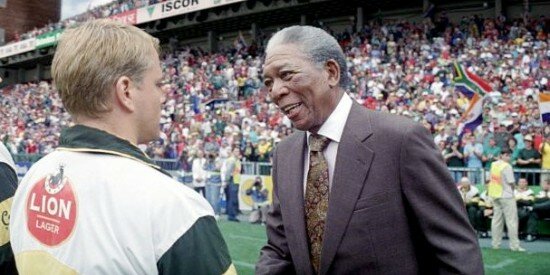Indian spiritual leader Mahatma Gandhi got his own Hollywood biopic. So did legendary French heroine Joan of Arc, gay rights politician Harvey Milk, sporting great Muhammad Ali, Cuban revolutionary Che Guevara…heck, even gangster rapper 50 Cent got one.
So why is it that Nelson Mandela — a man who served a 27 year jail sentence in South Africa before being elected President of the nation that imprisoned him – gets his Hollywood biopic thrown in with a sports movie? Are you trying to tell me his story wasn’t quite inspirational enough?
Worst of all, Invictus isn’t even a good sports film. Like the pseudo biopic on Mandela, the rugby half is both shallow and generic, qualities echoed by the horrendously mawkish theme song ‘Colorblind’ that is enough to make Invictus seem like a parody of an inspirational film. It’s hard to believe that the man responsible for this unmitigated disaster is none other than American film icon Clint Eastwood (Million Dollar Baby, Gran Torino).
Loosely based on John Carlin’s book ‘Playing the Enemy’, the film tells of how the South African rugby team, the Springboks, embarked on a seemingly impossible quest to win the 1995 Rugby World Cup in a hope that it will unite a divided nation. Mandela (Morgan Freeman, of course) believed that the racial tensions left over from the apartheid could be dissolved if both blacks and whites were to support the Springboks, a team whose colours, players and fans symbolised past discrimination against blacks. It’s therefore up to Springboks’ captain Francois Pienaar (Matt Damon) to turn his poorly performing side into a team of champions.
Even though Invictus drags on for over two hours, don’t expect to learn anything profound about Mandela or Pienaar. Anthony Peckham’s tortuous screenplay makes it abundantly clear that this movie is less about anyone in particular and more about an entire nation. It’s about South Africa’s ability to reconcile. A worthy subject indeed, but one that is handled far too superficially by Eastwood’s uncharacteristically heavy hand to make any kind of sincere, lasting impact.
Essentially, the film suggests that the multifaceted socio-political issues that had plagued South Africa for decades were resolved by a game of rugby. That blacks and whites suddenly became best buddies because they both barracked for the same team. And, most reprehensibly, that Nelson Mandela did little more as President than show up at each game to shake hands with the players. The film is so blinkered in that regard, it’s almost defamatory.
![invictus07[1] invictus071 267x239 custom Invictus (Review)](/wp-content/uploads/invictus071-267x239-custom.jpg)
|
It’s a shame because Morgan Freeman’s strong performance as Mandela reminds us of what an excellent biopic this could have been. Not only is his physical likeness is uncanny, Freeman nails Mandela’s wise and gentle demeanour. You feel at peace just watching him. Yet he is cast aside for the second half of the film so that Matt Damon’s insipid, undeveloped character can run head first into other male bimbos on the rugby field. Consequently, Freeman’s performance has been limited to showing just one side of Mandela, that being his legendary public persona, where every utterance appears to have come straight out of an inspirational quote book (“I have a very large family; 42 million”, says Mandela when asked about his family, a missed opportunity to delve into the man’s private life). Perhaps if Freeman was given another dimension of Mandela’s character to work with, he might have finally had his day at the Oscars. Not to be.
The last twenty minutes of Invictus are reserved entirely for the big game — Mandela now reduced to a cheerleader in the stands — and it was during this uninvolving finale that I seriously started to question where the Clint Eastwood of great films such as Unforgiven and Mystic River had gone. So many edits are made on action during this sloppy sequence that we rely solely on cutaway shots of the scoreboard to get any idea of what’s going on. And just when you think the film couldn’t possibly be any more overbearing, the last five minutes take place entirely in slow motion so that each garish reaction shot of that on-the-siren goal is a little more gag-inducive than the last.
 Follow the author Anders Wotzke on Twitter.
Follow the author Anders Wotzke on Twitter.







![Red [2010] (Review) Red [2010] (Review)](/wp-content/uploads/red011-e1287111015583-150x150.jpg)








